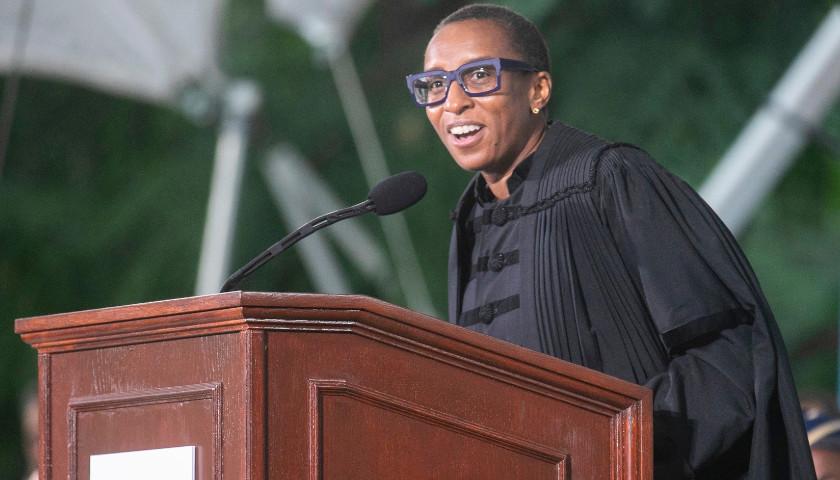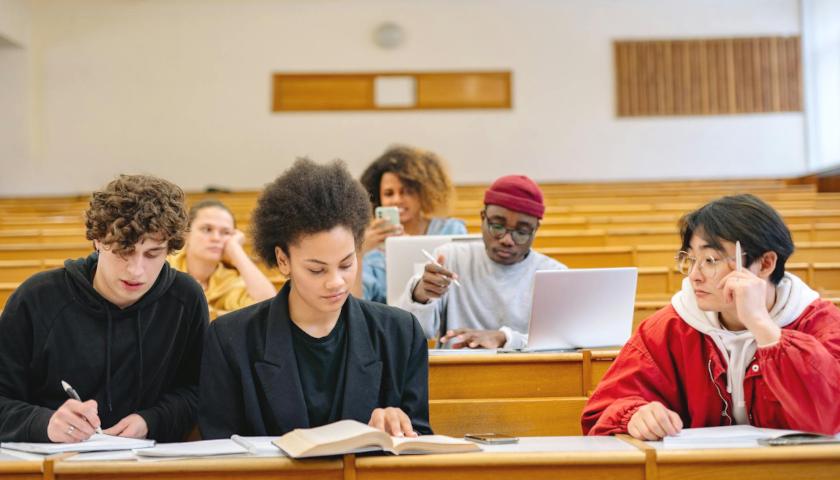by Dr. Carol M. Swain
In an ideal world, wrongdoers face swift and exact justice for their misdeeds. In reality, the legal system is costly. Justice comes at a steep price, one that I, and others whose works were allegedly plagiarized by Harvard’s Claudine Gay and others cannot afford.
After months of turmoil and legal back and forth, it is with a heavy heart that I announce that my intended copyright infringement case against former Harvard President Claudine Gay (pictured above) and the Harvard Corporation — a legal complaint that would have requested a jury trial — cannot be filed as planned in the United States District Court for the Middle District of Tennessee. The inability to raise sufficient funds for a trial (a steep minimum of $100,000 to $250,000) and the knowledge that the losing party could be ordered to cover the legal expenses of the victors, to which no limits exist under federal copyright law, gave me pause.
It turns out that justice is a rich man’s game, one I am not willing or capable of playing. Harvard has its $49 billion endowment, and lawyers familiar with the university assured me that their attorney was earning more than $1,000 per hour. To Harvard, $100,000 is nothing. That cost would jeopardize my life’s savings for a cause that is so much bigger than I am. Though worthy a cause it is, one individual cannot bear it alone. A restoration of academic integrity and a return to the traditional definition of plagiarism and the consequence once meted to abusers is a tremendous and costly task. The legal arena is an area where liberals are heavily funded and fond of lawfare. Realizing this, I made the painful decision to instruct my attorney not to file a suit. Instead, I will fight for justice using other means. I am ending the GiveSendGo campaign to raise legal funds, but I plan to make all legal documents from our effort publicly available.
My team assumed that Harvard, when presented with the evidence of plagiarism, would certainly want to settle the case. Harvard refused to even engage in conversation. Letters from Gay’s and Harvard’s attorneys stated that any lawsuit by me would be frivolous because, as they claimed, the theft of ideas is not protected under copyright law, her actions were minimal or de minimus, and that it was fair use.
Claudine Gay’s 1997 Harvard University dissertation borrowed heavily from my work, which also appeared as an unnamed strawman in some of her early articles. Ironically, Harvard University Press published — Black Faces, Black Interests: The Representation of African Americans in Congress (1993, 1995), and the National Science Foundation funded the dissertation research from that made the research possible. For me, my work won three national prizes and citations from the U.S. Supreme Court; but for Gay, my work helped her write a prize-winning dissertation and so much more. Gay enjoyed a lucrative career with a tenured professorship, fellowships, publishing deals, and prestigious leadership roles across academia.
Though I have no money to give, I am determined to hold Gay and Harvard accountable. I am seeking coalition partners inside and outside academia who would like to see institutions like Harvard, Columbia, and University of California at Los Angeles held accountable for any plagiarists that they have hired and protected on their faculties. The rot that is now condoned on university campuses is most certainly harming K-12 education.
Harvard University is aware of the outsized influence its wealth has on the justice system. When reports of Claudine Gay’s plagiarism appeared, Harvard threatened the newspaper pursuing the story with a defamation suit, and later sought to minimize the severity of a documented pattern of plagiarism that permeates nearly three-quarters of her work. Harvard opted to use its deep purse to cover up and defend her actions. Plagiarism was redefined as “duplicative language.” Moreover, the University’s report to the House Education and Workforce Committee that summarized its investigation of Gay hid the most egregious actions. Although Harvard allows Ms. Gay to make corrections to her dissertation and some of the challenged articles, she never addressed her use of my work. Though she stepped down from her presidency, she remains on the Harvard faculty, drawing a salary of almost a million dollars a year. Unthinkable!
What Gay did and Harvard protected is unacceptable for any academic institution. It creates a dangerous double standard. Gay and Harvard have made a mockery of higher education and, more seriously, cast doubt on the work of minority scholars who have worked hard to distinguish themselves in academia. I cannot allow that to stand, and I hope that more of you will join me in the work of forming a coalition that will host conferences, write books, and set up a website so injured parties (faculty, staff, and students) can share their own plagiarism stories. If we are successful, we can hold institutions of higher education accountable and restore academic integrity to higher education.
– – –
Dr. Carol M. Swain is a Senior Fellow at the Institute for Faith and Culture (Coral Ridge Presbyterian Church) and is the author of The Adversity of Diversity: How the Supreme Court’s Decision to Remove Race from College Admissions Criteria will Doom Diversity Programs (co-authored with Mike Towle).
Photo “Claudine Gay” by Jon Chase/Harvard Staff Photographer.





